The act of drawings seems particularly important to many designers.
 I actually find it hard to think without a pen in my hand and at least four more in
I actually find it hard to think without a pen in my hand and at least four more in my pocket. The act of making marks on paper mediates the flow of words. Donald Schon has referred to the architect as ‘having a conversation with his drawing’. This seems to be what Denise Scott Brown, the wife and professional partner of the architect Robert Venturi, means by the ‘eye re-interpreting what the hand has done’. The drawings designers make while thinking are frequently diagrammatic in the sense that they are not attempting to indicate three- or even two- dimensional form. Even organizing the brief is a graphically aided activity for Herman Hertzberger, architect and editor of the highly influential Dutch architectural magazine, Forum.
my pocket. The act of making marks on paper mediates the flow of words. Donald Schon has referred to the architect as ‘having a conversation with his drawing’. This seems to be what Denise Scott Brown, the wife and professional partner of the architect Robert Venturi, means by the ‘eye re-interpreting what the hand has done’. The drawings designers make while thinking are frequently diagrammatic in the sense that they are not attempting to indicate three- or even two- dimensional form. Even organizing the brief is a graphically aided activity for Herman Hertzberger, architect and editor of the highly influential Dutch architectural magazine, Forum.
I make notes during meetings in the form of little doodles, an attempt to use even text artistically, often switching between black, red and blue felt pens. With felt pens you can stroke the paper, a feeling akin to touching your mistress when the drawing is going well. Like I said. 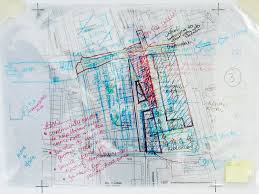
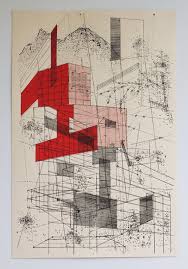
Frequently, drawings are overlaid and mixed together. Two-dimensional plans or sections can be seen with sketches and more diagrammatic marks all on the same piece of paper in what appears to be a confusing jumble. (Remember the ‘juggling’ of issues in the previous article?) Richard MacCormac (him again?) talks of his “thinking pencil”.
It is definitely true that designers need to draw in order to think, and perhaps we could conclude that a failure to draw might indicate a gap in thought. The drawings I make while thinking define the problems I find and thus are related to the problems I solve. These are serious drawings, lean and mean, they try to clarify and communicate. They are not drawings as in ‘art’.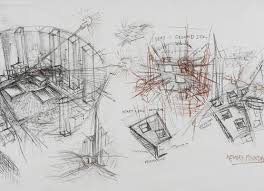
At least I try not to let them become that. Many times I am have been guilty of being seduced by the drawing to the point of designing the drawings itself rather than the object it represents. Just having fun. My felt pens are almost a part of me, I travel with them, the relationship is close, very natural, such a contrast to my awkwardness with people. I love my felt pens.
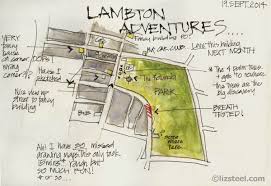 Richard MacCormac (I can hear you going: tch!) makes explicit reference to the role of the drawing tool as a way of mediating an appropriate cognitive phase. “These different frames of mind involve different instruments for producing and representing what you are doing.” What this suggests is that somehow the feel of the instrument in the hand and the way it interacts with the paper induces the right mental set. Marshall McLuhan taught us that the “medium is the message”, but for designers it seems that the medium is related to the frame of mind. (I am most at peace and very tranquil when I have a yellow ochre felt pen in my hand.) There is a sense of immediacy about drawing lines on paper that I think only a designer or an artist can feel.
Richard MacCormac (I can hear you going: tch!) makes explicit reference to the role of the drawing tool as a way of mediating an appropriate cognitive phase. “These different frames of mind involve different instruments for producing and representing what you are doing.” What this suggests is that somehow the feel of the instrument in the hand and the way it interacts with the paper induces the right mental set. Marshall McLuhan taught us that the “medium is the message”, but for designers it seems that the medium is related to the frame of mind. (I am most at peace and very tranquil when I have a yellow ochre felt pen in my hand.) There is a sense of immediacy about drawing lines on paper that I think only a designer or an artist can feel.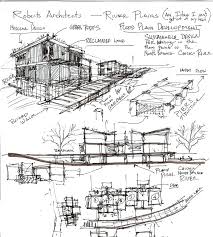
I like designing most of all on white A2 paper on a writing table. No backs of envelopes during plane journeys for me, I like to design in comfort and let the drawing breathe. No standing at drafting tables either, had enough of that, I’ve paid my dues. It’s only about having fun from now on, stroking and getting stroked. Hussain Varawalla, Senior Fun-Lover, HOSMAC (India) Private Limited, Mumbai.
This is the way I like to do it:Just like that.
Pingback: Google
Pingback: Google